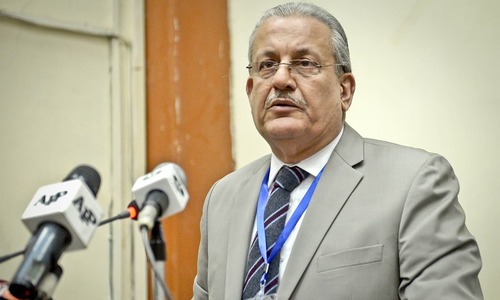ISLAMABAD: Senate Chairman Mian Raza Rabbani on Friday termed the accord reached between political parties on the revival of military courts unfortunate, fearing that the term of extension might go beyond 2019.
While chairing Friday’s session, he pointed out that two bills pertaining to military courts had been passed in 2015, yet two years later, the country found itself back to square one.
Read: Accord on military courts’ revival for two years
He said the Senate’s Committee of the Whole had taken steps before the cut-off date for military courts mentioned in the sunset clause of the Army Act 2015 and the Constitutional Amendment Act 2015, and had unanimously passed two bills on Jan 18, 2016.
He regretted, however, that no headway had been made. He observed that the present situation could have been avoided, had the bills been used as working papers. He said the two houses of parliament would do what they wanted on the issue of military courts, but hoped that the situation would not be the same two years from now. “I am pained at what is happening,” he remarked.
Dar tells Senate decision taken in view of peculiar law and order situation in country
Mr Rabbani has been a strong opponent of military courts and was moved to tears on Jan 7, 2015 after voting on the 21st Constitutional Amendment to set up military courts in the country. He said he had voted against his own conscience, adding that he had never felt more ashamed in his life. “I have been in the Senate for more than 12 years, but have never been as ashamed as I am today and I cast my vote against my conscience,” the Pakistan Peoples Party leader had said.
Responding to an observation of the Senate chairperson, Finance Minister Ishaq Dar said military courts were never a priority of any political party, but said that the decision had been taken in view of the peculiar law and order situation in the country.
He expressed the hope that Mr Rabbani would not be absent the day the House legislated on the revival of military courts.
He said the country was facing enormous challenges and Operation Radd-ul-Fasaad had been launched after Operation Zarb-e-Azb. He claimed there was no other choice.
Leader of the Opposition in the Senate Barrister Aitzaz Ahsan said the PPP had agreed to swallow a bitter pill on the government’s assurance that the term for military courts would be two years and that a national security committee would also be formed.
Separately, the PPP demanded that the proposed Riwaj Act and the regulation to set up local bodies in tribal areas, in the recently announced Reforms Package, be placed before parliament for discussion before the president signed any regulation in this regard.
Speaking on an issue of public importance, Senator Farhatullah Babar said keeping the Riwaj Act and LB law hidden from the public and parliament raised serious questions about the law replacing the notorious FCR in tribal areas. “It will be a disastrous step backwards if it turns out that the Riwaj Act was even more regressive and anti-human rights than the notorious FCR” he said.
He said the president must not sign these regulations merely on advice of the bureaucracy alone without it being discussed in the Parliament. The Parliament should also be taken on board on how local governments will be set up in tribal areas, the powers and responsibilities of those bodies, the mode of election, and whether elections will be held in all agencies simultaneously or in a staggered manner and how.
He demanded to know how the government proposed to extend the jurisdiction of superior courts to FATA as promised in the Reforms Package and the timeline for it.
“The government’s silence on these issues is deafening and raises doubts that the reforms package is more of publicity stunt rather than serious effort to mainstream the tribal areas.”
Published in Dawn, March 18th, 2017












































